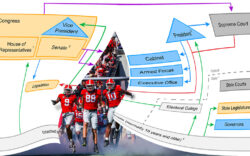I sometimes feel that I’m the only person in Athens who hasn’t been invited to a meeting with Selig Enterprises to hear about the plans for their proposed Walmart-plus development on the edge of downtown. That’s mainly because the press has been excluded from those meetings, although some of the press has been readily available to Selig when the developer wants to push its plans.
It is unusual in Athens for a development of this magnitude to progress this far without a meeting open to the press and the public. I believe that this oversight has contributed greatly to the difficulty our community has had in coming to grips with this project. I certainly understand the need for a big business deal to be negotiated exclusively among the parties whose money is involved, but there comes a point where the public has a need to know what is going on and how it affects our community.
As a journalist, I submit that a series of closed, private meetings is not the same as a public meeting, where we can all hear the facts together at the same time and respond to them in each other’s presence. When all we have is fragmented, small groups, we become like the blind men trying to describe the elephant: each focusing on a different part and having no patience with somebody else’s differing perception.
We have a tradition here of open public meetings to discuss big issues, though our most recent such experience, alas, is perhaps the exception that proves the rule. Many of the citizens who participated in last year’s public hearings on the Classic Center expansion came away feeling that they were just going through the motions with no possibility of making any difference.
Probably the closest parallel to the Selig development, though on a much smaller scale, was the Eckerd chain’s proposal several years ago to locate one of its superstores in the center of Five Points. People rose up in opposition and in support of the two locally owned pharmacies already there. The Eckerd executives, shepherded by Mayor Doc Eldridge, bravely attended a big public meeting, heard what the community was saying and graciously dropped their plans for that location.
And the National Bio and Agro-Defense Facility—we surely had some community discussions about that, because it was the federal government, and they were required to hold a series of open meetings. They got an earful and eventually went elsewhere. Nobody ever knew what part the public outcry played, but the government knew that, in spite of the open-arms welcome extended by the university, the local government and the chamber of commerce headed by Doc Eldridge: “If not this, what?â€), not everybody wanted Athens dominated by a vast, secret facility manufacturing highly toxic materials on the banks of the Middle Oconee.
Further back, Athens Regional Medical Center had to confront the neighborhoods when it announced plans to tear down 50 homes along and around King Avenue. Even somebody as strong-willed as then-hospital CEO Jack Drew listened and heard what the public was saying and significantly curtailed the impact of the project.
And there was the famous time when an aroused citizenry forced the re-design of the Classic Center the first time around—an outcome everyone agrees was in the best interest of the community, though the re-design was bitterly opposed at the time by the Classic Center Authority and most of the ACC Commission.
There’s no substitute for public meetings when the public interest is involved. Even without public meetings, though, Selig has heard from a lot of people, and the community has heard a lot from each other, so that the issues are becoming clear. The Selig/Walmart project is too damned big for the location, with unresolved impacts on traffic flow and connectivity to downtown and the surrounding neighborhoods. At the same time, most everybody agrees it would bring jobs and business and groceries and tax income from a large swath of property. The process has advanced from general outcry to pinpointing specific problems with the Selig concept and design that are affected by Athens-Clarke County regulations and requirements. One can only assume that Selig gives credence to these issues and is willing to address them. Public meetings would expedite the process.
Like what you just read? Support Flagpole by making a donation today. Every dollar you give helps fund our ongoing mission to provide Athens with quality, independent journalism.










